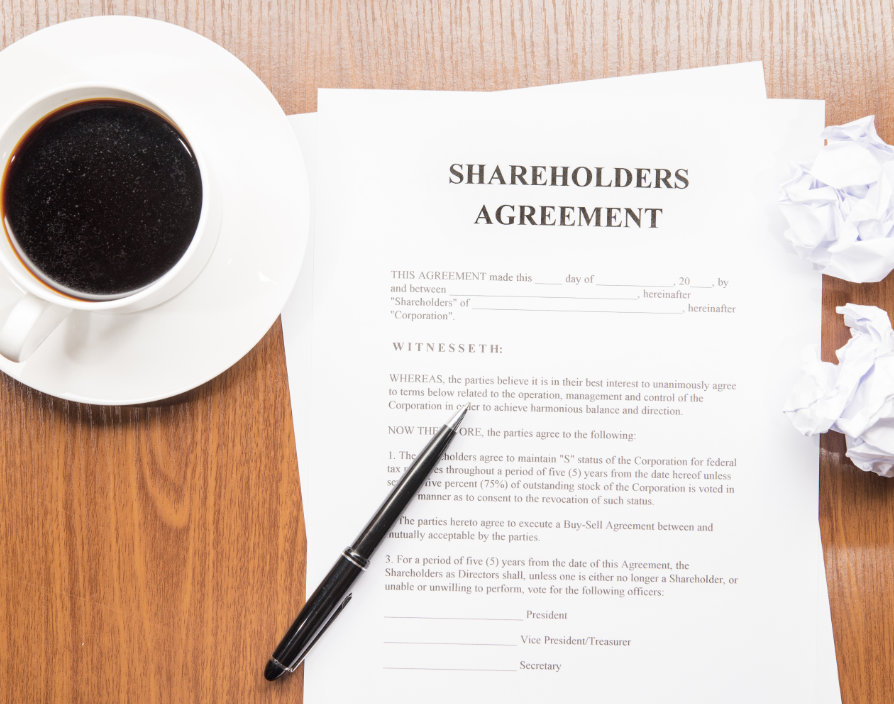Its early days: You and your business partner(s) have found the perfect franchise to invest in and are on the cusp of a new and exciting venture.
Brimming with ideas and enthusiasm, but short on time and money, is it really worthwhile spending precious resources on formulating a shareholders’ agreement? After all, at this early stage you are on good terms with your fellow investors. What could possibly go wrong?
The answer, quite simply, is ‘a lot’. Far too many business ventures fail because the parties did not think about how they would resolve potential disagreements. Nor did they consider what to do if one party wanted to leave but others wished to carry on.
Start as you mean to go on
Putting together a shareholders’ agreement forces you to think about the many and varied issues and scenarios that the company might face. It is much easier to talk through these issues while everyone is on good terms, and before problems have had a chance to arise.
Although it may be difficult to imagine a scenario that could negatively impact the health of a business, it is highly unlikely that investors will always see eye-to-eye with their fellow shareholders.
It is likely, that eventually, one investor will want to exit before the others do. So what happens if one person wants to sell, but the others do not? And this can be especially tricky if there are only two investors in a company.
A shareholders’ agreement provides a framework with which you and your business partners can work together. It forces everyone to talk through potential problem scenarios in advance. In reality, doing this at the outset effectively reduces the risk of future disputes. Everyone knows what they are committing to, and what is expected of them.
Failing to work all this through at the outset can have catastrophic consequences.
Disputes between shareholders can, in the absence of an agreed framework, cause a viable and profitable business to fall to pieces. This will deprive owners of the substantial value that they might otherwise have obtained on the ultimate sale of the business.
So what should a shareholders’ agreement look like and what information should be included:
What an investor can do without the consent of the others
You never want to discover that your co-investors have chosen a moment, such as when you are on holiday or off sick, to commit the company to something that you were not in favour of.
Your shareholders’ agreement will set out a defined list of things that can only be done with the consent of all parties. This will include – among other things – issuing new shares (which would dilute your voting influence and power), or the appointing of new directors.
What does the franchise agreement say?
If you are a franchisee, your franchise agreement will be likely to mandate who the shareholders are. It will also require you to seek the franchisor’s consent, and pay the franchisor’s costs, if you want to change the line-up at any point.
If you are the franchisor, you will want to make certain that your franchise agreements identify the shareholders of each franchisee’s business. Franchisors will need to know that the shareholders are guarantors of the franchisee entity’s obligations, and that the agreement addresses potential transfers or changes in share ownership.
Who is contributing what to the business?
If one party is lending money, how and when will they get that back? If you are contributing your time and resources, is everyone agreeing to pull their weight equally?
Who gets what dividends?
You may want to ensure that the business has a minimum level of working capital to fund growth. This may mean agreeing on conditions or limitations to dividends.
What happens if one investor wants to sell or leave, while the others don’t?
In practice, this is the single biggest cause of shareholder disputes. And, in the absence of a shareholders’ agreement, can lead to the collapse of a business. No matter how much you all like each other, and enjoy working together, eventually one of you will want to leave or sell first. It is wishful thinking to assume that you will all reach this point simultaneously.
Unlike PLCs, which are listed on a stock exchange, there is no market for selling your shares when it comes to private companies. And, more importantly, there is no framework for establishing what each share is worth. Shares in private companies are only worth what someone offers to pay for them. Furthermore, there are very few people who will be interested in buying a part share in a private company.
Most likely you will only achieve an exit if your co-investors agree to buy you out; Or, alternatively, you and your co-investors agree that under certain circumstances, you will all agree to seek a buyer for the business. If your co-investors are happy to buy you out, then your shareholders’ agreement needs to detail the circumstances and the terms.
Crucially, the agreement needs to provide a mechanism for valuing the shares or the entire business. In the absence of that, your shares are potentially worth nothing at all. The agreement will also determine whether or not your co-investors are obliged to buy you out under certain circumstances – or whether they simply have an option to.
These two scenarios are very different. In the latter, you and your co-investors will have to think about how you will deal with a disaffected shareholder who has lost interest. But this disinterested investor continues to hold shares, and/or continues to be a director, and therefore could potentially obstruct the day-to-day running of the business.
Finally, have you ever wondered what people are talking about when they mention ‘call options’, ‘put options’, ‘drag along’ or ‘tag along’ rights. These are, in fact, legal terms for addressing potential scenarios when someone is keen to exit a shareholders’ agreement.
This article comes courtesy of PartnerWise Franchise, which is a support business that collaborates with a range of clients, from start-ups to globally recognised brands.


































